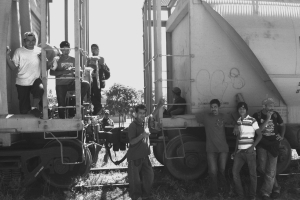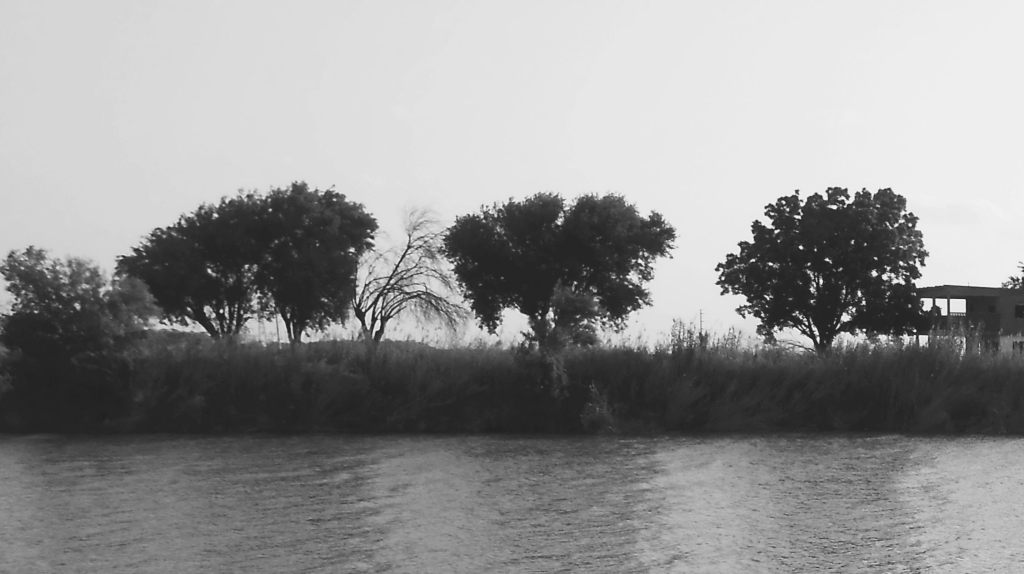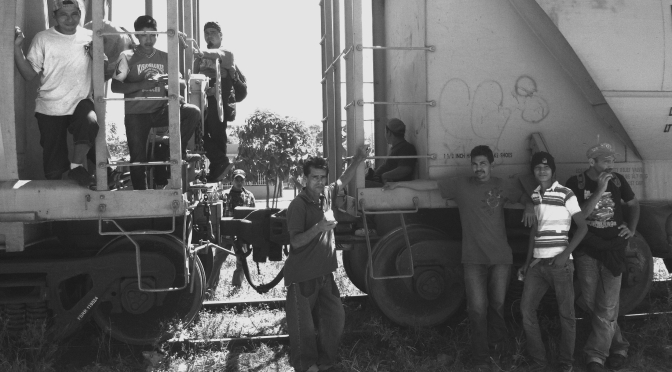This article by Denise Holley appeared in our fall newsletter.
Jordan Weiner met the Central Americans as they arrived exhausted with blistered feet at a shelter in Tenosique in southern Mexico. Lois Martin traveled to Honduras in 2012 and 2013 and learned why ordinary citizens feared for their lives.
Sarah Roberts, RN, witnessed extreme poverty as she tended the medical needs of a Maya community in Guatemala. Paula Miller and John Heid visited south Texas in May where hundreds of Central Americans streamed across the border.
These No More Deaths volunteers shed some light on why so many people risk a treacherous journey for the slim chance of asylum in the United States.
Honduras
For many Hondurans, there is no safe quarter anywhere in their country, Martin said. “There are drive-by shootings of campesinos. There are death threats to people who are human-rights leaders.”
Lois Martin: “The US is complicit in the violence in Honduras.”
Large landowners wield tremendous power over campesinos who want to farm land that could produce a profitable crop of palm oil, Martin said. Gangs and drug smugglers also threaten citizens.
The homicide rate in Honduras is the highest in the world, except for war zones, Martin said. “None of the deaths are investigated and no one is charged.”
With its corporate interests, military bases and recognition of the 2009 military coup, “the US is complicit in the violence there.”
Martin traveled throughout Honduras with La Voz de los de Abajo, a Chicago group, she said. When the visitors interviewed labor and human rights advocates, one told them, “You (visitors) are the only protection we have.”
Southern Mexico
Weiner worked, ate and slept in La 72 shelter in Tenosique, near the Guatemalan border, from January to July this year, she told NMD members August 18 in Tucson.

Weiner, a former logistics coordinator for NMD, welcomed thousands of desperate Central Americans, mostly Hondurans, to the shelter, she said. There they ate and rested for the next leg of their journey.
She interviewed each new arrival. “I got known as the person who helps people with their immigration problems,” Weiner said. “I never had a day off.”
Jordan Weiner: “There was a huge increase in children traveling through Tenosique while I was there.”
Weiner helped a few people apply for refugee status in Mexico, she said. But most travelers were bound for Texas where they hoped to apply for asylum in the US. When the freight train the migrants call “La Bestia” (The Beast) rumbled by the shelter every two or three days, “people were full of adrenaline,” Weiner said. They climbed atop the train and held on for their lives.
“There was a huge increase in children (traveling) while I was there,” Weiner said.
Weiner rode the train herself for six hours and arrived safely in Palenque, she said. She also accompanied two caravans of Central Americans last spring who asked the Mexican government for safe passage through the country. The first caravan won a thirty-day pass for the travelers, Weiner said. But the second evoked a violent response with beatings and arrests by Mexican authorities.
“The people who were most beat up were deported right away,” Weiner said. Mexico City attorneys arrived to apply for humanitarian visas for other injured migrants.
In August, Weiner received notice that all thirteen applications were denied, but the lawyers promised to appeal.
No More Deaths sent a $600 donation to La 72 shelter in May and shipped a box of medical supplies in July, Weiner said.
When Weiner returned to the US in late July, the Mexican authorities had begun blocking migrants from boarding the train, she said.
Guatemala
Poverty lingers in the mountain villages near Quiche, Guatemala, where Roberts has participated on a medical team since 2003, she said. She meets people who have migrated to the US, worked and returned with cash to build a home.
Sarah Roberts: “Crop failures mean people can’t support their families.”
“It (poverty) is the same as it’s been since the civil-war era (mid-1960s to 1996),” Roberts said. But now, hunger is worse. Crops are failing due to a severe drought and a fungus has infected the coffee plants, Roberts said. “This means people can’t support their families.”
South Texas
Miller and Heid attended an Operation Streamline hearing in Del Rio, Texas, in late May, she said. “In Del Rio, people were treated more humanely in the courtroom,” said Miller, who attended Streamline hearings in Tucson.

One distraught woman had been separated from her two-year-old granddaughter, Miller said. The judge directed the prosecutor to hunt for the child, Miller said. A Salvadoran woman who ran through a port-of-entry gate had left her country overnight. She worked with a youth organization and gangs had threatened her life, Miller said. The judge told the prosecutor to help the woman apply for asylum.
Central Americans traveling with children were spared prosecution, Miller said. But she and Heid observed families dropped off at Greyhound stations in Laredo and Brownsville with only bus personnel to help them.
In Falfurrias, Texas, they visited a cemetery where many unidentified migrants were laid to rest, Miller said. They watched as workers exhumed bodies that the South Texas Human Rights Center was trying to identify to notify their families, according to director Eduardo Canales.
No More Deaths members joined other Arizona border groups and voted August 25 to sign a statement calling for humane treatment of child migrants and families and legal help for them to apply for asylum.

